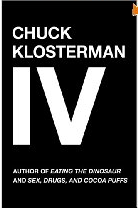Culture Can't be Wrong
On the way to trulondon last week I read Chuck Klosterman's excellent book titled 'IV: A Decade of Curious People and Dangerous Ideas'. 
One of the articles 'Cultural Betrayal', contained the observation 'Culture can't be wrong'. The main point of the piece is the idea that if 25 Million people watch 'American Idol' each week, and you can't see the point and despise the show, that the 25 Million people are not 'wrong'. You may not share their tastes or affinity for pop singing, or karaoke-bar style performances, but in a way you are the one that is 'wrong'.
What does all this have to do with technology, workforce, or anything remotely near what we typically cover on this site?
Not much probably, but let me take a crack at what I see as the connection, a take on technology and perhaps even social media elitism. At times in the new media echo chamber there is a kind of self and mutual reverential society happening. Like we are all in some cool, elite clique and boy the folks that have not jumped on board, or don't 'get it' are somehow not in our cool kids group.
So here is my take:
You are not 'better' or smarter than your buddy who has never heard of Twitter while you are sitting feeling cool about hitting the 1,000, 2,000 or whatever follower mark that is currently consuming your thoughts.
You are not of more value to society simply because you refuse to play 'Farmville' on Facebook. Something like 60 million people play Farmville. Some of those people are your friends, co-workers, nurses, firefighters, teachers, and coaches. 60 million people!
How many of your suppliers, customers, and shareholders are in that group? How many of the people that can directly and impactfully influence your organization's success are in a group that participates in a game that you may have shown public disdain for?
Failing to understand that group shows a marked lack of awareness and appreciation for what is actually happening in the world. Ignoring that group will result in missed opportunity. Insulting that group (and you know some of you do) could be a disastrous error.
Stop acting like a smart-aleck social media smartypants. Don't be an elitist. Don't be that person. Don't.
Culture can't be wrong.

 Steve
Steve


